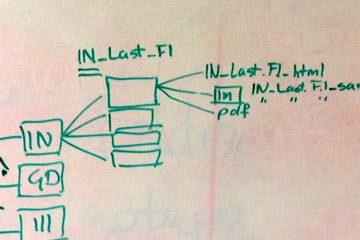What's in a name?
 When a website is involved, quite a bit. There's the site name, which ideally is short and memorable: Google, Yelp, Yahoo. Or at least memorable as is, I hope, TheViewFrom32.
When a website is involved, quite a bit. There's the site name, which ideally is short and memorable: Google, Yelp, Yahoo. Or at least memorable as is, I hope, TheViewFrom32.
Behind the scenes, though, there are multiple layers of file and folder/directory names. When you visit a site you probably don't pay much attention to this. Somebody did, though, and it gets complicated.
This was the topic of our Web Publishing 2 class discussion today. Three groups of students each drew a flow chart and talked about how to name files and folders in a relatively small website (about 400 pages and/or images).
It gets complicated
There are two main concerns involved in naming files/folders. The names need to be easy for the website builders to recognize and work with. The bigger the site, the more complicated this task becomes. Numbers often are easier than words, so it may lead to something like this from the Library of Congress website:
www.loc.gov/pictures/collection/ade/item/95858980/
It's pretty clear that this links to a picture in the "ade" (Architecture, Design & Engineering) collection. Good luck on guessing that item 95858980 is a set of architectural drawings for a Blue Bell hamburger restaurant, though.
Make it readable
An alternative is to try to keep the names understandable, like this link to this year's Merit Scholar show at the CSU Art Gallery:
http://csuohio.edu/artgallery/2011-2012/meritscholar/index.html
Simply by looking at the web address you understand what it's about. An added—and very important—benefit to this approach is that search engines understand it too, leading to better search engine rankings.
Make it consistent
The best approach is to think about all the possible types of things that might be part of your website, and develop a naming convention for files: a standard system that you and anyone else working on the site will use. Especially when working on a team, this is essential.
There are also techical issues involved: punctuation marks ( # ! ?, etc.) in a file name causes big problems. Restricting names to a-z, 0-9 and (-) is the simplest solution.